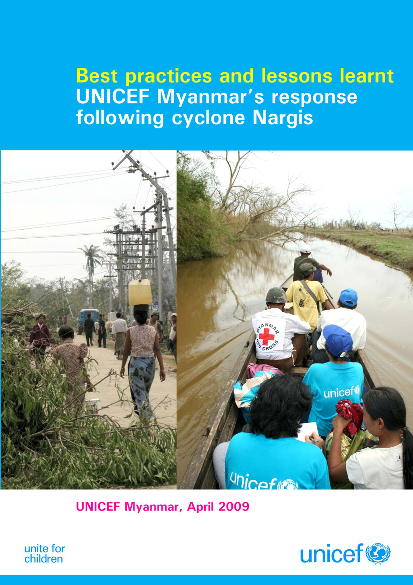
The relief efforts following cyclone Nargis brought about an extraordinary spirit of partnership between the Government of Myanmar, the United Nations, various donor agencies, local private sectors and many international and local non-governmental organisations. In spite of difficult political situations all humanitarian agencies were able to unite their efforts to support the immediate humanitarian needs of the population affected by the disaster, considered worse in the living memory of Myanmar. UNICEF was among the first to respond by dispatching its staff within the first 24 hours to conduct initial assessment and distribute pre-positioned relief supplies. UNICEF in Myanmar mobilised cash, supplies and personnel according to Emergency Preparedness and Response Plan which was finalised only two month prior to the cyclone. UNICEF Myanmar was ably assisted by UNICEF New York, Geneva and the East Asia and Pacific Regional Office in deploying additional technical assistance. Meanwhile many donor agencies came forward with cash contribution and in some cases in-kind support. Various UNICEF National Committees also offered generous assistance to the relief and recovery efforts. There were many difficulties, especially during the initial phase, in bringing staff into the country, limitation in getting internal travel permits for non-Myanmar citizens, damaged road networks, lack of appropriate transportation, lack of banking systems in the periphery, fuel supply, inadequate office space and accommodation for field staff. UNICEF managed to surmount many limitations and shortcomings in order to launch and continue intense relief efforts in collaboration with many local and international humanitarian agencies. This document is the product of an independent review of UNICEF’s overall efforts in mounting relief work followed by early recovery efforts. This review covers UNICEF activities with regard to emergency response between May 2008 and January 2009. UNICEF gratefully acknowledges the work done by freelance consultant Ms. Sumithra Bala with total dedication and professionalism. Ms. Bala visited Myanmar twice and conducted several focus group discussions in the field and interviewed more than 90 humanitarian workers employed in 26 different agencies that collaborated with UNICEF during various stages of relief and recovery work. This document is an independent endeavour to summarise the achievements, best practices, lessons learnt and constraints encountered while implementing the massive relief work within the context and environment of Myanmar. The facts were verified using multiple sources to give credibility to the reported findings. The documentation of the lessons learnt captures the knowledge and experience of a critical phase in UNICEF Myanmar’s work and hopefully will serve as a reference in future. UNICEF extends thanks to Ms. Bala for her involvement in documenting UNICEF’s efforts. UNICEF would also like to acknowledge the respondents for providing required information to Ms. Bala. It is hoped that the lessons learnt and good practices recorded in the document will contribute to further refine and augment relief and recovery efforts and improve preparedness and response capacity of UNICEF Myanmar.